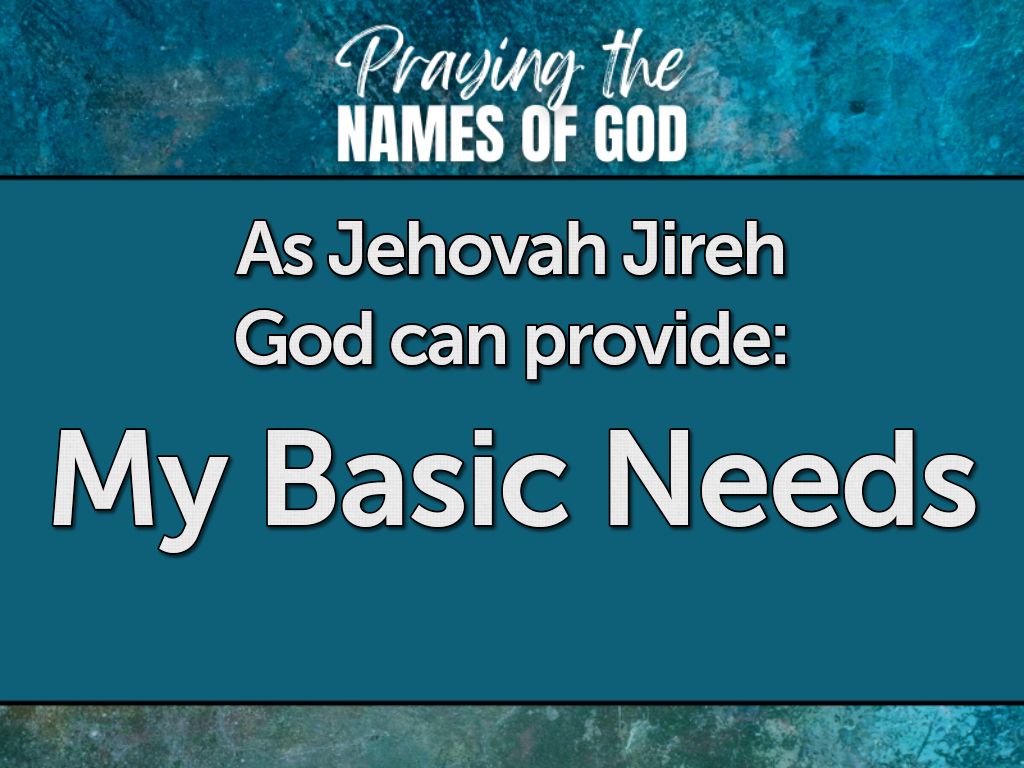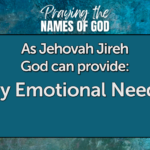As Jehovah Jireh – The Lord can provide for our basic needs.
Scripture tells us that God is our provider, Jehovah Jireh, who can meet our every need. It is natural for us to worry about our basic needs, such as food, water, and shelter. However, as we look to the examples in the Bible, we find reassurance that God is faithful to provide for His children, even in the most challenging circumstances.
In Exodus 16, we see the children of Israel complaining against Moses and Aaron in the wilderness. They longed for the days when they had plenty to eat in Egypt, despite being in bondage. In response to their complaints, God promised to rain bread from heaven for them. He instructed them to gather a certain amount each day, and on the sixth day, they were to gather twice as much. God tested them to see if they would obey His instructions and trust in His provision. And true to His word, God provided manna, the bread from heaven, sustaining the Israelites throughout their time in the wilderness.
Another powerful story of God’s provision is found in 1 Kings 17. During a time of severe drought and famine, God directed the prophet Elijah to go to a widow in Zarephath for food. When Elijah found her, she was preparing a final meal for herself and her son, as they had no resources left. When Elijah asked her for food, she expressed her desperate circumstances, with only a handful of flour and a small amount of oil remaining. But Elijah encouraged her to trust in God’s promise and make him a small loaf of bread first. He assured her that God would provide, and she chose to trust and obey.
Miraculously, as the widow trusted and obeyed, her flour jar and oil jug never ran out. Day after day, she and her son had enough food to eat. God’s provision sustained them throughout the entire duration of the famine. It was through her obedience and faith that she experienced the unending supply of God’s provision.
Jesus, in teaching His disciples how to pray, included the request, “Give us this day our daily bread.” In this simple prayer, we acknowledge our dependence on God as Jehovah Jireh, our provider. We recognize that God is the one who can meet our daily needs. We can approach Him confidently, knowing that He is faithful to provide for us just as He provided for the widow and the children of Israel.
Worry and anxiety have no place in the life of a believer. Jesus Himself instructed His disciples not to worry, assuring them that if God takes care of the birds and the fields, He will surely take care of His children. Instead of worrying, we are called to worship God for who He is, Jehovah Jireh, our provider. We are invited to pray, calling upon Him to meet our daily needs. When we seek first His kingdom and His righteousness, He promises to add all these things to us.
Today, let us choose to trust in God’s provision. As we face uncertainties and challenges, let us worship instead of worry, and pray instead of panic. Remember that our heavenly Father knows our needs and is faithful to provide. He is Jehovah Jireh, the God who can provide, and He will sustain us each day as we place our trust in Him.
Prayer: Dear Heavenly Father, thank You for being my provider, Jehovah Jireh. Today, I bring my needs before You, knowing that You are faithful to meet them. Help me to trust in Your provision and to seek Your kingdom above all else. Teach me to worship instead of worry and to pray instead of panic. May Your presence and provision sustain me through every circumstance. In Jesus’ name, we pray. Amen.
Discussion Questions:
- Reflect on the story of the widow in Zarephath. How does her act of obedience and trust in God’s provision inspire you? How can you apply her example in your own life?
- In what areas of your life do you find it most challenging to trust God’s provision? Why do you think it is difficult to fully rely on Him in those areas?
- How does the concept of Jehovah Jireh, God as our provider, impact your perspective on worship and worry? How can you cultivate a worshipful attitude and trust in God’s provision in your daily life?
- What are some practical steps you can take to seek God’s kingdom first and trust in His provision, as Jesus instructed? How can you prioritize spiritual and eternal matters over temporal concerns?
- Consider the passage where Jesus encourages His disciples not to worry, using the illustrations of birds and fields. How does this teaching challenge your own tendency to worry? How can you actively surrender your worries to God and place your trust in Him?
- Share a personal experience where you witnessed God’s provision in your life. How did that experience deepen your trust in Him? How can you remind yourself of that provision during times of doubt or anxiety?
- How does understanding God as Jehovah Jireh impact your prayer life? In what ways can you incorporate a reliance on God’s provision in your daily prayers and requests?
- Discuss the difference between seeking God’s provision versus seeking material wealth or comfort. How can you align your desires with God’s will and trust Him to provide what is truly necessary for you?
- How does the promise of God’s provision impact your attitude towards generosity and sharing with others? How can you use the blessings you receive to bless others and demonstrate God’s provision in their lives as well?
- In what ways can you encourage and support others in their journey of trusting in God’s provision? How can you share stories of God’s faithfulness to inspire and strengthen their faith?


